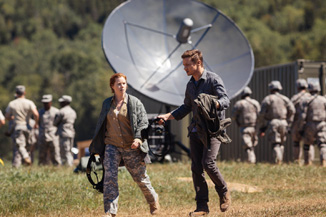2017 Calvin Awards: Best Screenplay
By Reagen Sulewski
February 24, 2017
BoxOfficeProphets.com

Taking first place by a big margin, and with nearly half of the first place votes, is Eric Heisserer's script for Arrival. A beautifully constructed puzzle box of a film, it took the fertile concept of first contact, embedded the most thorough and yet fascinating discussion of linguistics in blockbuster history within it, and still found room for a heartbreaking personal story. That rare mix of pulse-pounding thriller and thought-provoking drama, Arrival dazzled us with its story and grand ideas.
Second spot goes to a more conventional thriller, Hell or High Water by Taylor Sheridan. A modern take on the bank robbery film, it also had some tricks up its sleeve, and gave us a look into the heart of those left behind in the modern economy, with sharp ideas about the generational cost of grinding poverty. Mixed in with this are a colorful cast of southern kooks and misfits, both of the classic and modern varieties, given some of the best banter and interplay outside of a Coen Brothers movie, and you have a tremendous screenplay as a result.
Kenneth Lonergan's script for Manchester by the Sea finds third place, with its heartbreaking tale of regret and loss. Lonergan has a natural talent for humanizing the misfits and damaged people of this world, and this script is perhaps his finest example to date, descending upon a family broken by tragedy in both the past and present, and linking those together to make a script that's both intimate and grand at the same time.
Fourth spot goes to La La Land, by Damien Chazelle. In some ways a simple script as most musicals tend towards, that simplicity masks a deeper look into passion, both of the personal and professional kinds, and how those two can collide. Eventually, a clever structure bends the film back on itself to make us reconsider everything we've seen so far, and creates the perfect bittersweet ending.
Moonlight's coming-of-age drama winds up in fifth. Barry Jenkins' story follows a young, gay black man from youth to adulthood, and the trials and tribulations of being doubly minority. Its non-linear structure turns the film into poetry about what it is to be a man, and the powerful influences that can shape lives, especially for those on the fringes.
Sixth place goes to Shane Black and Anthony Bagarozzi for The Nice Guys, fashioning a '70s detective story for modern sensibilities. Filled with Black's trademark crackerjack hilarious and caustic dialogue, it also makes for a great shaggy dog story.
Seventh spot is the reward for Yorgos Lanthimos and Efthymis Filippou's absolutely bonkers script for The Lobster. Set in a world where couplehood is enforced by law, or else you're transformed into an animal, its world building is beyond compare and creates a biting satire about the demands of society. Conceptually, it's one of the year's most daring scripts.
Eighth goes to the socially conscious Zootopia, which had an uncommonly deep story for a Disney animated film, telling a wonderful story about equality and acceptance, and filling it with some of the year's best jokes and scenes.
Hidden Figures, by Allison Schroeder and Theodore Melfi, takes ninth, for finding some of history's unsung heroes of the space program and blending their story with that of the emerging civil rights movement. It's a vital story that deserved to be told, and here it's handled with grace and dignity.
We round out our list with the profane and hilarious screenplay for Deadpool by Rhett Reese and Paul Wernick. A meta-criticism of the excess of superhero films, while at the same time being an excellent and enjoyable example of the genre, its gleeful fourth-wall breaking and self-commentary was a breath of fresh air to the year.
Calvins Intro
Best Actor
Best Actress
Best Cast
Best Character
Best Director
Best Overlooked Film
Best Picture
Best Scene
Best Screenplay
Best Supporting Actor
Best Supporting Actress
Best TV Show
Best Use of Music
Breakthrough Performance
Worst Performance
Worst Picture